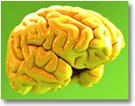Neural Evidence for Sudden Insight
 A recent study provides intriguing information about the neural dynamics underlying behavioral changes associated with the development of new problem solving strategies. A recent study provides intriguing information about the neural dynamics underlying behavioral changes associated with the development of new problem solving strategies.
The research, published by the Cell Press issue of the journal Neuron, supports the idea of "a-ha" moments in the brain that are associated with sudden insight.
Our daily lives are filled with changes that force us to abandon old behavioral strategies that are no longer advantageous and develop new, more appropriate responses. While it is clear that new rules are often deduced through trial-and-error learning, the neural dynamics that underlie the change from a familiar to a novel rule are not well understood.
"The ability of animals and humans to infer and apply new rules in order to maximize reward relies critically on the frontal lobes," explains one of the researchers who led the study, Dr. Jeremy K. Seamans from the Brain Research Centre at the University of British Columbia (UBC) and Vancouver Coastal Health Research Institute. "In our study, we examined how groups of frontal cortex neurons in rat brains switch from encoding a familiar rule to a completely novel rule that could only be deduced through trial and error."
Specifically, Dr. Seamans with colleagues from UBC and collaborator Dr. Daniel Durstewitz from the Central Institute of Mental Health in Germany were interested in determining whether networks of neurons change their activity in a slow gradual way as an old strategy is abandoned and a new one is learned or whether there is a more abrupt transition.
Using sophisticated statistical techniques to study ensembles of neurons in the medial frontal cortex on a trial-by-trial basis as rats deduced a novel rule in a specially designed task, they found that the same populations of neurons formed unique network states that corresponded to familiar and novel rules.
Source: Cell Press
|